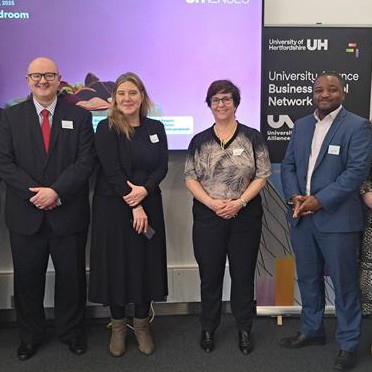This article first appeared in Research Professional News on the 13 September.
UA Chair Debra Humphris looks at the challenges and opportunities for universities in the year ahead
It is hard to remember a time of more importance for higher education in this country. This year, we’ve seen just how central our universities are to the UK’s ambitions—and to the national renewal we all strive for as we recover from Covid-19 and its aftermath.
Over the past few months, universities have again and again shown their value—supporting the nation during the pandemic, handling a smooth transition for staff and students to digital remote learning and moving at speed to accommodate learners and deal with the fallout from this year’s A-level grading results.
As for much of the country, the early days of the pandemic were given over to large-scale digital reform and innovation. Universities gave accommodation and conference centres over to the frontline pandemic response while simultaneously moving teaching and student support online. I am amazed at the scale of change huge institutions were able to implement in the time available.
As chair of University Alliance, I’m particularly proud of the flexibility shown by alliance universities in supporting students, staff and their communities during an extraordinary period of uncertainty. At the University of Brighton, our three-year digital roadmap took a major step forward in just 10 days. Alliance universities are leaders in innovative teaching and learning methods, so for them much of this wasn’t new, but it would not have been possible without tremendous work by many staff in universities across the country.
The general move to online learning has exposed some of the greatest inequalities in our system. Alliance universities donated thousands of pieces of IT equipment and made a considerable financial investment to ensure that no learner experienced digital poverty. With the blended learning approach set to continue, it will be vital to ensure no students fall through the gaps.
Tougher tests to come
It will also be vital to carry momentum over as we begin perhaps our most challenging academic year. Universities are taking great care over the return of staff and students to campus, working in consultation with the Department for Education and the Department of Health and Social Care to develop plans in line with the latest guidance and to continue to monitor the situation closely and respond accordingly.
But throughout these vital next few weeks, we need to be assured stability. An autumn without any major political reform will allow universities to continue to be flexible and do everything in their power to support students who experience disruption or stress on their return to campus.
While the late-hour change in admissions policy caused chaos in the days following A-level results, it highlighted that universities clearly continue to be valued and popular. The increased demand for university places is to be welcomed, particularly on strategically important courses such as healthcare. However, there are very real, practical challenges facing an already stretched sector as a result.
We welcomed the announcement by universities minister Michelle Donelan of £10 million in additional funding for capital investment, but these challenges will require innovative policy solutions, not just finances. Placement availability is an obvious one. University Alliance has long been cautioning that the issue here lies not with demand but with capacity, and unblocking the workforce pipeline requires not just top-down funding but locally rooted solutions developed between universities, NHS trusts, social care and schools.
We have continued to raise these issues through the newly formed ministerial higher education taskforce, where I am the sole vice-chancellor on the subgroup tasked with looking at placements. Our partnerships with the public sector and industries are at the heart of our focus on preparing graduates for employment.
But it’s important we use this period of disruption to go further. We welcomed Health Education England’s additional funding boost in addressing healthcare’s placement availability; it should be seen as a positive first step. There should be additional placement availability for other essential public sector courses, such as teaching and policing, and we will continue working with the Department for Education to look for further innovative solutions.
Don’t forget Brexit
It’s easy to forget, with everything that has happened over the past few months, that the UK’s withdrawal from the European Union is fast approaching. Given recent discussion and lack of dialogue, it’s evident that Brexit is set to throw up a whole host of challenges for higher education.
This autumn, we need to see an outline and consult on plans for the Shared Prosperity Fund, which should be integrated with the Innovate UK agenda. Many university research and innovation programmes, so essential to the UK’s response to the pandemic, are part-funded through EU structural and investment funds.
Further delays in outlining plans for replacing this funding will hinder anchor institutions like ours in understanding how they can support economic growth and address skills deficits at a time when their own resources are likely to be depleted.
With all that universities are coping with because of Covid-19 and with Brexit approaching fast—not to mention the increasing challenges of climate change—I again stress that it would be misguided for there to be any more late policy decisions or fundamental changes to higher education this autumn. We need stability and time to focus on our students, our staff and our mission.
Universities to the rescue
The road to recovery will not come easy, but there is an opportunity: the R&D Roadmap. This can help address some uncertainty, as well as some old issues such as the UK’s talent, innovation and growth gaps and imbalances.
To mitigate these, consideration in the detailed R&D plan should be given to disparities in need, prosperity and opportunity in locations and communities within regions—so the government can truly ‘level up’.
Levelling up and providing increased investment in widening R&D excellence across the UK can and should help alliance universities, with their strong integration of R&D, education and skills, to power us through the uncertainty ahead.
Our universities have proven themselves to be adaptable and flexible to the short-term demands of this crisis, but they also have the long-standing relationships with community, industry and employers to meet the needs of the future.




